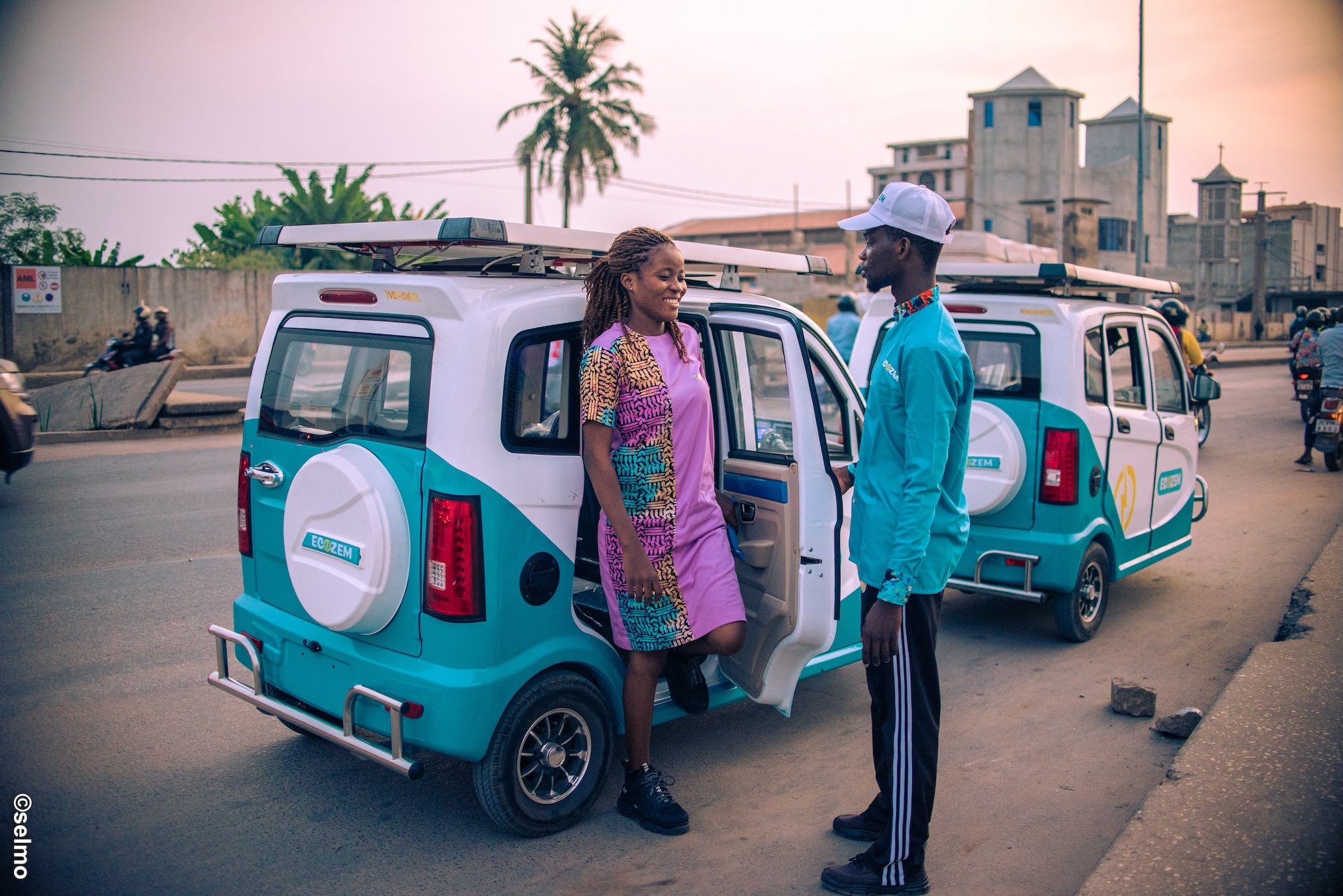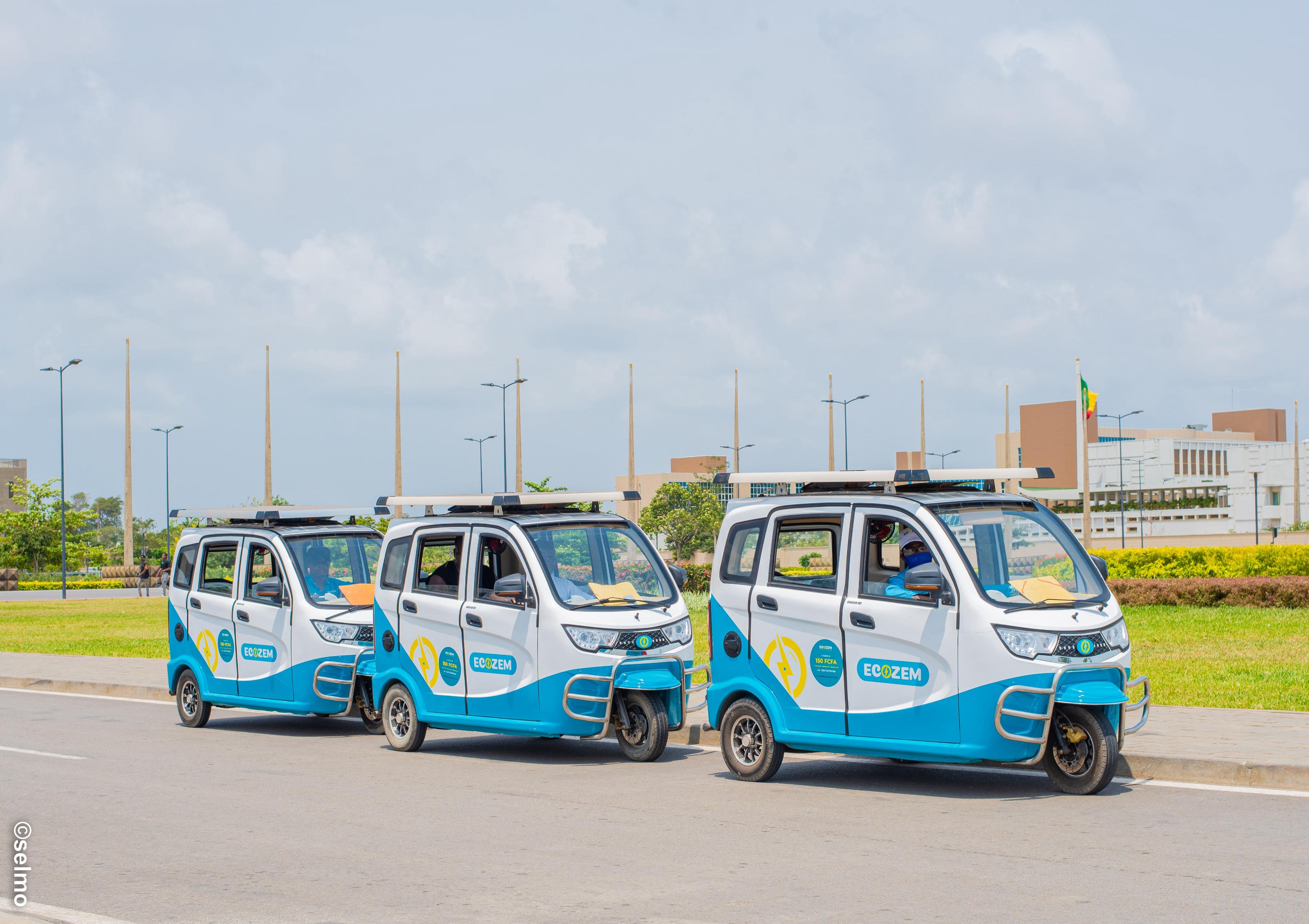In Benin, limited transportation options have long affected daily life and economic opportunities. Recently, road transport has expanded, but this growth has created new challenges. The sector’s rapid expansion, driven largely by reliance on road networks, has outpaced the country’s capacity to introduce effective emissions regulations and develop efficient public transport. As a result, environmental impacts have increased, including higher levels of road-related pollution.
Fèmi Tankpinou, a Beninese entrepreneur saw an opportunity to intervene. Tankpinou is the CEO and founder of ECOZEM, an eco-friendly transportation company that is on a mission to transform the way people commute in his home country. By recycling metal waste to create locally-made, solar-powered electric vehicles — including Tuk-Tuks, tricycles, bikes, and cars — this initiative meets the urgent need for affordable and reliable transport for everyday citizens, while also being sustainable through the use of renewable energy rather than fossil fuels.
Growing up, Tankpinou experienced the difficulties many students and workers in rural and peri-urban areas faced in reaching school and work. Limited access to transport created barriers to education and daily life. As a student, he often walked long distances because transport was not readily available or affordable for his family. On rare occasions, he could take a local motorcycle taxi, known as a “zémidjan.” These experiences shaped his commitment to developing affordable, reliable, and safe transport solutions.
We spoke with Tankpinou about his business innovation. Here’s what he shared:
Can you share your journey to founding ECOZEM? What inspired you to focus on sustainable and solar-powered transportation solutions in Benin?
Tankpinou: “The idea came when I realized how deeply dependent we are on fossil fuels, and how that dependency creates both economic and environmental challenges. Benin, like many African countries, has abundant sunlight, yet our transport still relies on imported fuel. I wanted to turn this challenge into an opportunity. That’s how ECOZEM was born; it was born to provide affordable, clean, solar-powered transportation that reduces emissions and gives people better access to essential services.”
How do ECOZEM’s solar-powered tuk-tuks work and what makes them beneficial for rural and peri-urban transportation?
Tankpinou: “Our tuk-tuks are electric vehicles powered by batteries, which are recharged using solar energy. This makes them completely independent from fossil fuels. They’re small, efficient, and adapted to local road conditions. For rural and peri-urban areas, they’re ideal because they are affordable, easy to maintain, and can operate even in places where fuel stations are scarce.”
 On a busy road in Benin, an ECOZEM driver opens the door of a solar-powered three-wheel enclosed tricycle for a customer stepping out.
On a busy road in Benin, an ECOZEM driver opens the door of a solar-powered three-wheel enclosed tricycle for a customer stepping out.
Why is the reliance on fossil fuels in the transportation sector a major issue in Africa, including Benin?
Tankpinou: “Relying on fossil fuels creates three big problems: economic, environmental and social. African countries spend billions importing fuel, which drains resources; transport emissions [as we know] worsen climate change and air pollution; lastly, fuel price fluctuations make transport unaffordable for many. ECOZEM is addressing this by offering solar-powered electric tuk-tuks. They don’t depend on fuel imports, they are powered by clean energy, and they reduce both costs and emissions. It’s a model that is sustainable for people and the planet.”
What impact have your electric vehicles had on students?
Tankpinou: “We’ve been able to serve students who would otherwise walk long distances or miss classes due to unreliable transport. Many now arrive on time, more focused, and more motivated. In some communities, we’ve seen school attendance rise because students finally have a safe and dependable way to get to school and parents do not need to worry every day about how their children get to school.”
How does ECOZEM empower local youth?
Tankpinou: “We train young people in solar vehicle maintenance, battery systems, and basic operations. These are skills that prepare them for the future green economy. One of our success stories is a young man who started as a trainee and now manages a small team of drivers operating our tuk-tuks in Abomey-Calavi. He’s not only employed but also creating opportunities for others. We have a big potential in job creation and youth empowerment in Africa, the bigger we grow the more we can offer jobs to the youth and the training. “
What challenges have you faced, and how have you overcome them?
Tankpinou: “Some challenges include raising funds, changing mindsets about new technology, and dealing with infrastructure gaps. We’re overcoming them by building strong partnerships, being persistent in educating communities, and creatively financing our projects through grants and startup competition prizes. Each challenge has taught us resilience and adaptability.”
Why do you think that local ownership and African-led solutions are important?
Tankpinou: “If we keep importing solutions we will never be independent, so the main point is not that the solution solves our problems, but are we able to control the solution? Are we able to control the production, the making, the malfunction? Because if we are solution-consumers and not solution-producers. At some point, yes, we will have our daily needs in terms of transportation and in terms of food and everything else, they will be covered; but we will not be sovereign. At the end of the day nothing will change.
Africa will use its money, resources, the aid we receive will always go back, outside the continent because we are not spending to put infrastructure here. African-led solutions are crucial for development and for the future of the continent — not just in transportation, but in all sectors, they are crucial. For ECOZEM, for example, we are currently buying most of our vehicles and equipment from China, all we do here is assemble the vehicles, but the vision is that in five years from today we should be able to at least make the vehicles locally. The technology exists, it is there, it just requires funding and the skills and expertise to do it locally.
We should be able to do this because if we want to scale up, if we need to go from Benin and scaling up to across Africa, we can’t keep relying on China, we have to be able to source locally and produce locally, and this will increase our capacity to create new job opportunities, training opportunities for youth and really localizing the capacity of production is crucial for the development in all sectors in Africa.”
What is the government of Benin doing in the transition to clean energy within the transportation sector and what more needs to be done?
Tankpinou: “In my sector, we don’t pay taxes when we import our vehicles, for electrical vehicles there is a tax acceleration and this is a very encouraging measure that the government implemented three years ago. The government has [also] encouraged people to invest in electrical mobility, it’s something we are really proud of. There are a lot of parliament programmes by the government, there is an agency that has been set up, created just last year to promote youth entrepreneurship that is doing great and every year recruits projects. There are a couple of initiatives in the country that have been set up, not just on entrepreneurship but also sustainability because in every programme put in place the main focus is put on sustainability, across all sectors, they make sure to promote sustainability and renewable energy. One thing that could be improved, Benin, like most West African countries, doesn’t have a clear transportation system. Transport is operated by private companies and there is no clear transport plan in the country, no railroads, no trains, no public transportation, no subway, no public transport passes, nothing that is structured by the government or by the national administration to say: ‘this is what we want transportation to be done in our country’ or at least in our main cities. So this is something that is really lacking in the country. When you come to Porto-Novo, on our roads everybody drives how they want and that is a big challenge we have to face.”
What are your future plans for ECOZEM? Do you plan to expand to other African countries?
Tankpinou: “Yes, absolutely. In the near term, we plan to scale within Benin, adding more vehicles and expanding to new cities. In the long term, we aim to replicate the model in other African countries facing similar transport challenges. Our vision is to become a leading African company in sustainable mobility.”
 ECOZEM owned solar-powered electric, three-wheel enclosed tricycles, parked on a clear road in Benin.
ECOZEM owned solar-powered electric, three-wheel enclosed tricycles, parked on a clear road in Benin.
How do you envision the future of sustainable transport in Africa, and ECOZEM’s role in it?
Tankpinou: “I envision a future where Africa is not just catching up, but leading in sustainable solutions, with locally manufactured solutions turning African innovators' ideas into tangible solutions in the transport sector. Transport should be clean, affordable, and accessible to everyone. ECOZEM’s role is to pioneer this shift, to prove that solar-powered mobility is not only possible, but practical and scalable. We want to show that African solutions can solve African problems, while contributing to the global fight against climate change.”
Tankpinou's journey with ECOZEM highlights a vital shift in Benin’s transportation sector, showing that innovative, locally-driven solutions are essential in addressing local issues. By providing affordable, solar-powered transportation, ECOZEM not only enhances mobility but also empowers communities and fosters youth training in renewable energy and green jobs. This initiative sets a precedent that could inspire similar projects across Africa, leading to a greener and more equitable future.